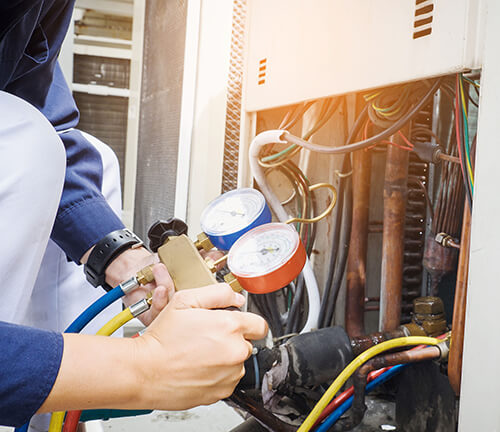Exactly How to Choose the Right A/c System for Your Requirements
Choosing the ideal a/c system is a vital decision that calls for mindful consideration of different variables. Begin by examining your home's size, layout, and unique needs, as these aspects dictate the essential capability and setup of the system. Furthermore, establishing a spending plan that includes installation and lasting operational prices is crucial. As you weigh your alternatives, comprehending energy effectiveness ratings and the effects of your regional environment will play a significant duty in your choice. The myriad of system kinds offered can complicate this process, leading one to ask yourself which path eventually leads to optimal comfort and performance.
Evaluate Your Home Dimension
Examining your home dimension is an essential very first step in choosing the suitable A/c system. An A/c system that is also little will certainly battle to maintain comfortable temperature levels, leading to enhanced energy consumption and use on the system.
To properly analyze your home dimension, gauge the square video of each space, taking into consideration elements such as ceiling height and the layout. In addition, take into consideration the insulation top quality and the variety of windows, as these elements influence thermal efficiency. Houses with open floor strategies might need different system arrangements contrasted to those with several separated areas.
Utilizing the Guidebook J tons computation method can give a much more accurate estimate of your HVAC requires. This method make up different elements, including local climate, solar gain, and tenancy patterns. By thoroughly evaluating these facets, you can guarantee that your chosen a/c system is properly sized, bring about boosted comfort, power efficiency, and long life of the equipment.
Determine Your Spending Plan
Identifying your budget is an essential action in the cooling and heating system choice procedure, as it sets the parameters for your options - DMAKS HVAC. A HVAC system is a considerable investment, and understanding your monetary restrictions will assist limit options that fit within your means
Begin by examining not just the initial acquisition rate but also setup prices, which can vary dramatically depending on the complexity of the job. Furthermore, think about recurring costs such as maintenance, repair work, and power intake. A system may appear economical at first yet can cause higher costs over time if it is less effective.
It is a good idea to allot a backup fund for unforeseen expenses that might arise during installation or initial system adjustments (DMAKS HVAC). Furthermore, discover funding options or rebates that may be readily available, as these can alleviate the concern of in advance expenses
Ultimately, having a clear spending plan enables you to involve with cooling and heating specialists better, guaranteeing you get customized guidance that aligns with your monetary objectives and home requirements. By being diligent concerning your budget, Related Site you can make enlightened decisions that boost convenience without endangering monetary security.
Evaluate Energy Performance
Power performance plays a vital function in the general efficiency and cost-effectiveness of your HVAC system. Look for systems with a high Seasonal Energy Effectiveness Proportion (SEER) for cooling and a high Yearly Gas Utilization Efficiency (AFUE) score for heating.
Additionally, think about the Energy Star accreditation, which symbolizes that the system fulfills stringent efficiency guidelines set by the Environmental Protection Firm. Purchasing an Energy Star-rated heating and cooling system can result in considerable cost savings gradually, especially in areas with severe temperature fluctuations.
Another factor to evaluate is the system's size and ability. An extra-large or small device can bring about inadequacy and raised power expenses. DMAKS HVAC. Homepage Appropriate sizing, commonly figured out with a Hand-operated J tons computation, guarantees that the system operates at optimum performance


Think About Environment and Setting
When choosing a HVAC system, it is vital to think about the neighborhood climate and environmental problems, as these variables significantly influence the system's performance and performance. Different areas experience differing temperature level extremes, humidity levels, and seasonal modifications, all of which influence home heating and cooling needs.

Additionally, local environmental factors, such as air high quality and possible irritants, need to inform your selection. Systems furnished with advanced filtering modern technologies can assist minimize pollutants and offer cleaner air. Additionally, consider the power sources offered in your location-- some heating and cooling systems are extra efficient when useful content powered by gas or renewable resource resources.
Ultimately, aligning your heating and cooling system option with your neighborhood climate and environmental considerations will certainly bring about boosted comfort, improved efficiency, and reduced energy expenses.
Explore System Kind and Attributes
As homeowners seek to optimize comfort and effectiveness, discovering the various sorts of a/c systems and their special attributes comes to be crucial. The primary kinds of HVAC systems consist of air conditioning, heatpump, ductless mini-split systems, and furnaces. Each system uses unique advantages tailored to different needs and preferences.
Central air systems give consistent air conditioning throughout a home, making them suitable for bigger areas. Heatpump function as both heating and cooling down remedies, making use of power to move warmth, which can cause lower power expenses. Ductless mini-split systems are ending up being progressively prominent due to their flexibility and convenience of installment, enabling property owners to control the temperature level in private spaces without extensive ductwork.

Conclusion
In final thought, choosing the proper HVAC system necessitates careful consideration of different aspects, consisting of home dimension, budget restrictions, energy effectiveness, regional climate, and offered system types. A detailed analysis of these components makes certain optimum comfort and cost-effectiveness. By following a structured approach, homeowners can make informed choices that straighten with their details demands and choices, ultimately bring about enhanced interior air high quality and energy cost savings.